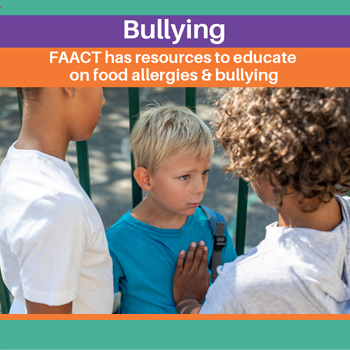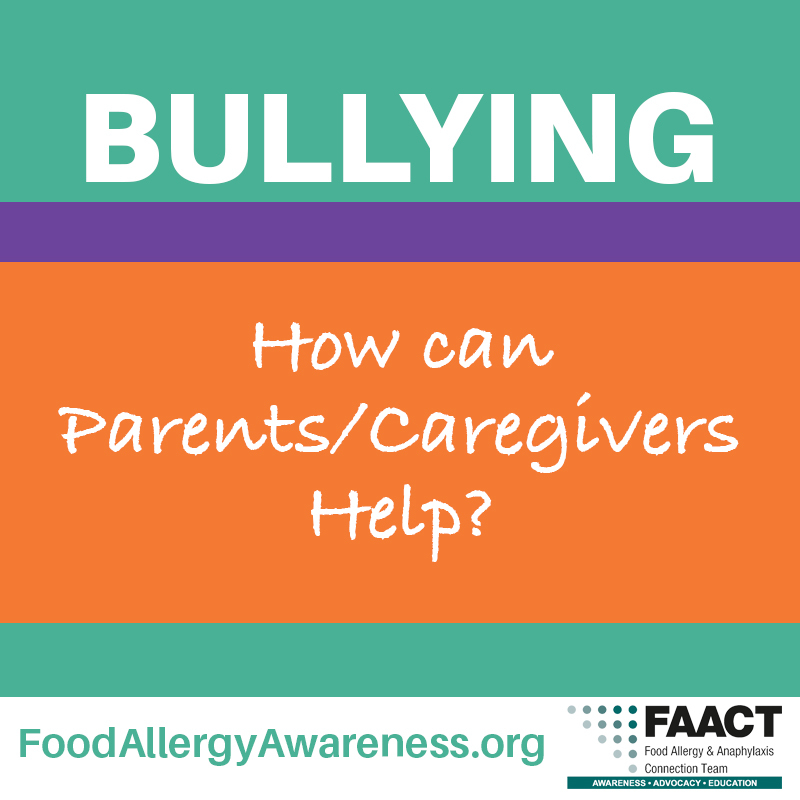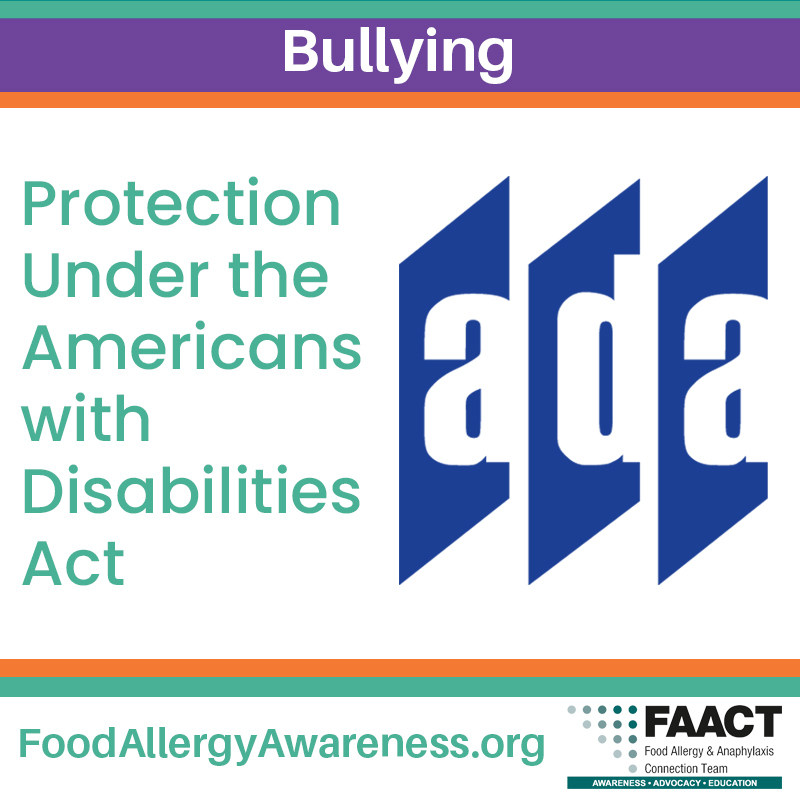Bullying - General Information

Bullying: General Information
BULLYING
/boolē-ēng/ verb.
Unwanted, aggressive behavior that involves a real or perceived power imbalance. The behavior is repeated, or has the potential to be repeated, over time. Includes making threats, spreading rumors, attacking someone physically or verbally, and excluding someone from a group on purpose.[1]
Bullying is more than just teasing among children. The difference is the power imbalance (real or perceived) and the intention to cause harm.[2] For children with food allergies, the power imbalance can be quite real – and the harm potentially life-threatening.
Although most bullying reported by children happens at school, it also occurs other places children are together, including playgrounds, school buses, at home or in a friend’s home, restaurants, camp, and on the Internet.[3] In some cases, the school bully is not a student but a teacher or other adult.[4]
Bullying a child with a food allergy can range from taunting the child to physically assaulting with the allergen. It is considered a form of “disability harassment.”
* Please read FAACT's CEO, Eleanor Garrow-Holding's, article with Living Without Magazine titled Food Allergy Bullying, which was published in the January 2013 issue. She shares her story when her son, Thomas, was bullied in second grade while living in Northern Virginia and what she had to do to advocate for him to keep him safe in school. The article covers the risks, the warning signs, your rights, and more.
FAACT
Fatalities among adolescents with food allergies are more common due to risk-taking behaviors.

How Can Parents/Caregivers Help?
Parents/Caregivers play an important role in their children’s educational lives. Being part of their child’s school in some form, when possible, is essential to reducing the risk of school bullying. Parents/Caregivers should advocate for inclusive practices in the school district to improve school climate, which will help all students. Be proactive and talk to the school administrator about how he or she would respond to food allergy bullying. Reviewing how the administrator will respond will be helpful if a bullying incident occurs. Additionally, ask about any anti-bullying guidelines or policies that both the parent/caregiver and administrator can review together.
In a study of children with food allergies and their parents/caregivers, parents/caregivers knew about bullying related to food allergies only half the time. When parents/caregivers were aware of the bullying, the child’s quality of life was reported to be much better than that of children whose parents/caregivers were not involved. [5]
Whether or not you suspect your child is being bullied, engage him or her in daily conversations about school and social activities. This allows the child to feel trust, open up about any bullying activity if it occurs, and get parents involved. Ask open-ended questions that require a response and can lead to further discussion, such as:
- Who did you play with at recess/PE?
- Who did you eat with during lunch?
- How was your bus ride to/from school?
In addition, find out what the school is doing to address bullying, including on play grounds (where teachers may have a harder time tracking such incidents) and on school busses. If your child’s school does not have effective bullying strategies and policies in place, advocate for change with the principal.[6] Take the same action with camps your child may attend.
If bullying has occurred in school, it’s important to take appropriate action, including:
- Speak with your child using the tools mentioned above.
- Request a meeting with the principal and/or assistant principal and teacher to talk about the incident to get a better understanding of what happened. Make the meeting request in writing (by e-mail) to document the date.
- Maintain a safe environment for your food-allergic child by not changing his or her schedule, which will provide comfort and familiarity. It is especially important for students to know which school staff are trained on food allergies and who to go to for help.
- Some bullying cases may meet the criteria for harassment or assault, which can result in legal consequences for the bully. In this case, immediate response is important. If threats of physical injury occurred (or injury itself), you may want to contact local police authorities.
- Age-appropriate disciplinary measures should be considered. Not all children who bully peers with food allergies realize it is dangerous. Age may be one factor. Education and awareness is important to create an inclusive environment to combat bullying.
- Speak with school counselors for help on educating teachers and students at the school about food allergies. This will provide a more inclusive climate for your child and other food-allergic students.
- Review the incident as part of a IHP/IHCP, 504 Plan and/or IEP meeting with school administrators. It may be appropriate to include accommodations to address your food-allergic child’s individual needs further.
References
[1] U.S. Department of Health and Human Services, StopBullying.gov, accessed December 2013.
http://www.stopbullying.gov/what-is-bullying/definition/index.html
[2] Dr. Rashmi Shetgiri, University of Texas Southwestern Medical Center
[4] Saint Louis, Catherine.
[5] Shemesh, E. et al.
[6] Education.com. “Ten Actions ALL Parents Can Take to Help Eliminate Bullying.” https://www.education.com/magazine/article/10-parents-eliminate-bullying/
[7] Musgrove, Melody, Ed.D. and Yurdin, Michael. “Dear Colleague; Bullying of Students with Disabilities.” August 2013. U.S. Department of Education, Office of Special Education and Rehabilitative Services
[8] Yudin, Michael. “Keeping Students with Disabilities Safe From Bullying.” Posted August 20, 2013, on StopBullying.gov.
https://www.stopbullying.gov/blog/2013/08/23/keeping-students-disabilities-safe-bullying

Protection Under the Americans with Disabilities Act
Food allergy anaphylaxis is a health impairment that substantially limits one or more major life activities, such as breathing and eating, under the Americans with Disabilities Act Amendment Act (ADAAA). Therefore, students with food allergies are considered disabled under these terms. Students with food allergies are offered equal access to programs and activities provided by facilities that receive federal financial assistance, such as public schools, under Section 504 of the Rehabilitation Act of 1973. Section 504 is a non-discriminatory regulation for students with disabilities. Parents/Caregivers may refer their child for a Section 504 evaluation in order for their child to be found eligible to receive appropriate accommodations.
The U.S. Department of Education states that schools have an obligation to ensure a student with disabilities who is bullied continues to receive a free appropriate public education (FAPE) as outlined in his or her individualized education program (IEP). The Department of Education encourages using IEPs and 504 plans to outline approaches for preventing and responding to bullying as well as provide additional support to students with disabilities.[7],[8]

